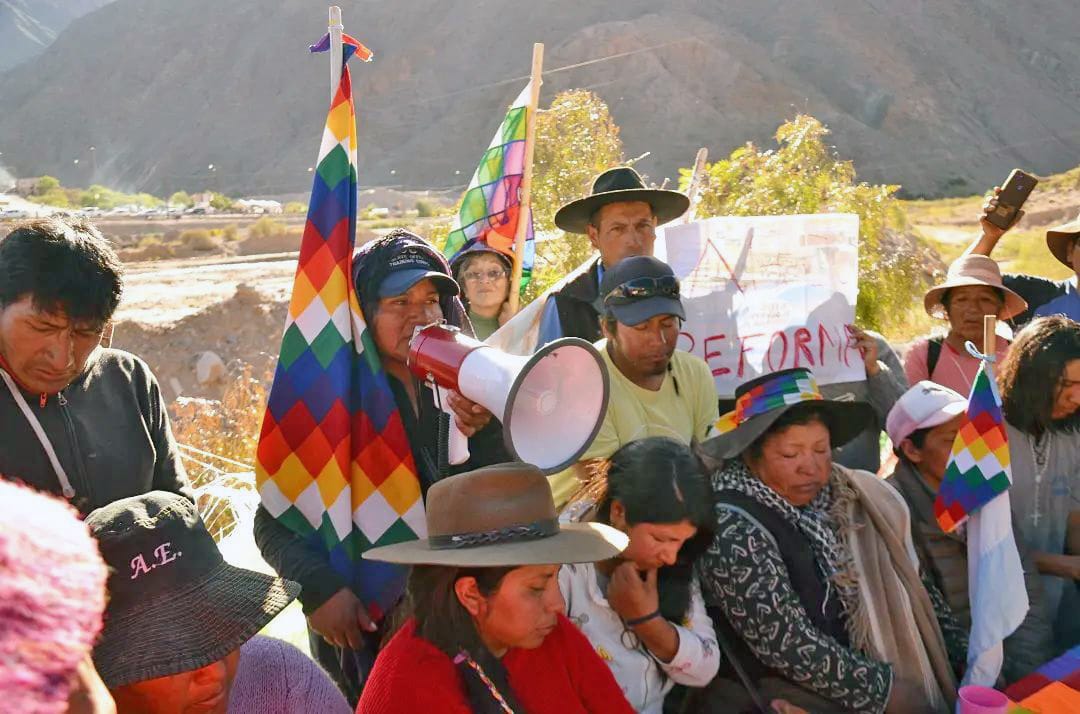
Assembly of numerous indigenous communities in Purmamarca, Jujuy. Photo: Twitter/@telesisaoficial.

Orinoco Tribune – News and opinion pieces about Venezuela and beyond
From Venezuela and made by Venezuelan Chavistas

Assembly of numerous indigenous communities in Purmamarca, Jujuy. Photo: Twitter/@telesisaoficial.
Raúl Choquevilca—the president of the indigenous community of Ocumazo, in Humahuaca, Jujuy province of Argentina, and member of the Assembly of the Third Malón de la Paz—confirmed on a local radio interview that a new day of protests was beginning in Jujuy against the express and unconsented regional constitutional reform, promoted by Gerardo Morales, the governor of Jujuy province.
In a communiqué released this Thursday, July 6, Choquevilca informed that all roads will be blocked and that no traffic will be allowed “until the constitutional reform is repealed,” although they clarified that they will allow the transit of essential services, such as ambulances, medical emergencies, transfers of deceased persons, persons with disabilities, and police vehicles.
Argentina: Police Repression Continues in Humahuaca, Jujuy Province
Among the principle claims, the indigenous community demands that the law be declared unconstitutional, that the repression and persecution of community leaders cease, an end to the exploitation of lithium, and the resignation of Gerardo Morales and his minister of security, Guillermo Corro, who was singled out for his radicalized reactions, “adding fuel to the fire” by making new threats against demonstrators.
“We held our spirit of refusal from the first moment,” said Raúl Choquevilca, in a conversation aired on AM750 radio. “We took to the roads as a last resort. They don’t leave us many options to be able to go out to fight the injustice they are committing.”
“The injustice could even be slight, but our outrage is not only regarding this,” Choquevilca continued. “As soon as Morales took office, he passed a provincial law termed ‘5915’. This law was also not consensual, nor was it made known to the indigenous communities, because it affects their territories.”
Argentina: Repression Against Indigenous People in Jujuy (+Human Rights in Venezuela)
“It is enough to look at the title of the controversial regulation,” he added. “‘Law of administrative easements of electrical pipelines and special regime of constitution of administrative easements for the development of projects of electric energy generation from renewable sources on community property’.”
In other words, a regulation that proposes the development of new energy production in territories inhabited by native communities, without considering any of the rights of the peoples of the area.
“[This reform] was aggressive from the start, and our indigenous communities made legal presentations so that this law would not go into effect. At the end of the day, this law is just a prelude to what we are denouncing: this subjugation,” concluded the representative of Third Malón. “This Constitution would come to be the synthesis of all the abuses we have been denouncing. We are convinced that our struggle is for the right to life.”
Translation: Orinoco Tribune
OT/JRE/AU
Support Orinoco Tribune team’s unique, amazing, and unmatched work!
5.5 years providing honest and responsible anti-imperialist information about the Global South!
66 months working for you, 18.5K posts published, 60 original pieces in the last 4 months, 21 YouTube interviews over the last 12 months, and much more to come!
Your donations make a big difference!